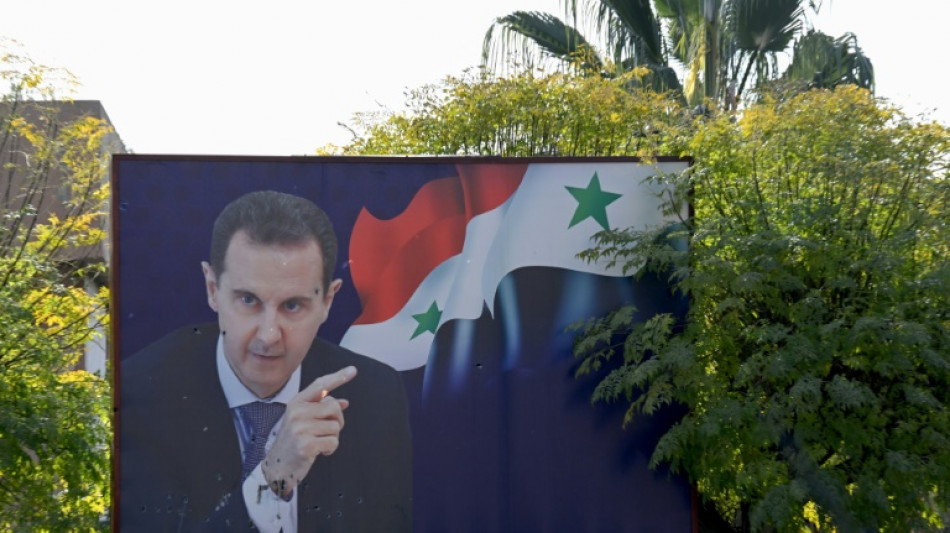

Syria accuses Israel of deadly destabilisation campaign
Syria accused Israel on Thursday of mounting a deadly destabilisation campaign after a wave of strikes on military targets, including an airport, and a ground incursion killed 13 people.
Israel said it responded to fire from gunmen during an operation in southern Syria and warned interim President Ahmed al-Sharaa that he would face severe consequences if its security was threatened.
Israel has carried out an extensive bombing campaign against Syrian military assets since Islamist-led rebels toppled longtime strongman Bashar al-Assad in November.
It has also carried out ground incursions into southern Syria in a bid to keep the forces of the new government back from the border.
Authorities in the southern province of Daraa said nine civilians were killed and several wounded in Israeli shelling near the city of Nawa.
The provincial government said the bombardment came amid Israel's deepest ground incursion into southern Syria so far.
The Syrian Observatory for Human Rights said the dead were local gunmen who were killed "while attempting to confront Israeli forces, following calls by the mosques in the area for jihad against the Israeli incursion".
According to the Israeli military, its forces were conducting operations in the Tasil area, near Nawa, "seizing weapons and destroying terrorist infrastructure" when "several gunmen fired at our forces".
They "responded by firing at them and eliminated several armed terrorists from the ground and from the air", a spokesperson said. There were no Israeli casualties.
"The IDF (military) will not allow the existence of a military threat in Syria and will act against it," the spokesperson added.
Israeli Prime Minister Benjamin Netanyahu demanded in February that southern Syria be completely demilitarised and said his government would not accept the presence of the forces of the new Islamist-led government near Israeli territory.
In December, Netanyahu ordered troops to enter the UN-patrolled buffer zone that separated Israeli and Syrian forces along the 1974 armistice line on the Golan Heights.
- 'Unjustified escalation' -
On Wednesday, Israel hit targets across Syria including in the Damascus area.
The Syrian foreign ministry said the strikes resulted in the "near-total destruction" of a military airport in the central province of Hama and wounded dozens of civilians and soldiers.
"This unjustified escalation is a deliberate attempt to destabilise Syria and exacerbate the suffering of its people," it said in a statement on Telegram.
Israeli Defence Minister Israel Katz hit back with a warning to Sharaa in which he pointedly referred to the president by the nom de guerre he used as an Islamist rebel commander.
"I warn Syrian leader Jolani: If you allow hostile forces to enter Syria and threaten Israeli security interests, you will pay a heavy price," he said.
"The air force's activity yesterday near the airports in T4, Hama and the Damascus area sends a clear message and serves as a warning for the future," he added.
The Israeli military said its forces "struck military capabilities that remained at the Syrian bases of Hama and T4, along with additional remaining military infrastructure sites in the area of Damascus".
A Syrian source told AFP that the T4 airbase was coveted by the new government's main foreign backer, Turkey, for future use by its military.
Speaking during a visit to Paris on Thursday, Israeli Foreign Minister Gideon Saar accused Turkey of playing a "negative role in Syria".
"We don't think Syria should be a Turkish protectorate," he said.
Israel has said it wants to prevent advanced weapons from falling into the hands of the new authorities, whom it considers jihadists.
Sharaa fought for Al-Qaeda in Iraq after the US-led invasion of 2003 and later set up a Syrian branch of the jihadist network before breaking off all ties.
The Syrian ministry said the Israeli strikes came as the country was trying to rebuild after 14 years of war, calling it a strategy to "normalise violence within the country".
Neighbouring Jordan said Israel's repeated attacks on Syrian territory constituted a clear breach of the 1974 disengagement agreement between the two countries and a "flagrant violation of international law".
Qatar, a key ally of the new government, condemned the strikes as a "blatant violation of Syria's sovereignty and territorial integrity".
During a visit to Jerusalem last month, EU foreign policy chief Kaja Kallas said Israeli strikes on Syria were "unnecessary" and risked further escalation.
burs/kir/ser
J.P.Hofmann--MP



